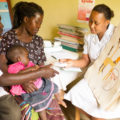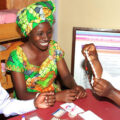By Dr. David Olubukunmi Jesudemi ( Senior Doctor Outreach Women and Children Hospital Lagos)
Family planning is an informed decision by an individual or a couple as to when to start having children and how much time in between births. This is usually done through different methods including the use of contraception, abstinence, natural planning, or hormonal birth control. Family planning is affordable, safe and promotes the quality of life for the entire family.
Methods of Family Planning
Condom
- We have both male and female condoms.
- Condoms are thin, stretchy pouches that you wear on your penis ( Male condoms ) or inside the vagina ( Female condoms ) during sex. Condoms provide great protection from both pregnancy and STDs.
- They help protect against pregnancy and sexually transmissible infections (STIs), including HIV which can lead to AIDS. Partners share responsibility for safer sex and contraception.
- They are worn on the penis before sexual intercourse.
- Condoms have expiring dates and one do need to check on the expiration dates of condoms before use.

Male and Female Condoms
Spermicide
- Spermicide is a kind of birth control that has chemicals that stop sperm from reaching an egg. You put it in your vagina before sex to prevent pregnancy.
- It is mostly used by women.
- It is a good
- Apply in the vagina 10 – 15mins before sexual intercourse.
- do not provide protection from sexually transmitted infections (STIs); are not considered an effective form of contraception when used alone; may produce side effects such as vaginal or penile irritation; may increase the risk of developing urinary tract infections (UTIs).
Diaphragm
- The diaphragm is a barrier method of birth control. It is moderately effective, with a one-year failure rate of around 12% with typical use. It is placed over the cervix with spermicide before sex and left in place for at least six hours after sex.
- When used correctly with spermicide, a diaphragm or cap is 92-96% effective at preventing pregnancy– this means that between 4 and 8 women out of every 100 who use a diaphragm or cap as contraception will become pregnant within a year.
- It is mostly used by women.
- The spring in the rim of the diaphragm forms a seal against the vaginal walls. The diaphragm covers the cervix and physically prevents sperm from entering the uterus through the os.
Breastfeeding
- Breastfeeding delays the return of your periods, so it can work as a method of birth control. This is known as the lactational amenorrhea method (LAM)
- When you do it perfectly, the LAM birth control method can be about as effective as hormonal contraceptives (like the pill). About 2 out of 100 people who use breastfeeding as birth control get pregnant in the 6 months it can be used after a baby is born.
- Breastfeeding is basically nature’s birth control. LAM is an easy, safe, and free way to prevent another pregnancy for up to six months. This can come in especially handy if you don’t want to deal with other birth control methods.

Breast Feeding
Contraceptives
- The Pill is very effective if you take it exactly as you are supposed to – one pill a day, taken at the same time each day. You should also use back-up contraception such as condoms if you have diarrhoea or vomiting, or are taking a medication that could change the effectiveness of the birth control pill. Using condoms is always important to decrease your chances of getting a sexually transmitted infection (STI).
- Birth control pills (also called oral contraceptive pills and the “Pill”) are a type of female hormonal birth control method and are very effective at preventing pregnancy.
- Most pills contain two types of synthetic (man-made) female hormones: estrogen and progestin. The hormones in the pills prevent pregnancy by suppressing the pituitary gland, which stops the development and release of the egg in the ovary (ovulation).
- Disadvantages include; Nausea, Headache, mood chase, sore and enlarged orifice
Contraceptives and Pills
Implants
- The birth control implant is a tiny, thin rod about the size of a matchstick. The implant releases hormones into your body that prevents you from getting pregnant.
- A nurse or doctor inserts the implant into your arm and that’s it — you’re protected from pregnancy for up to 5 years. It’s get-it-and-forget-it birth control.
- The implant is one of the best birth control methods out there — it’s more than 99% effective.
- The implant doesn’t protect you from STDs, so use condoms along with the implant to help protect you from both pregnancy and STDs. That’s how you make sex worry-free.
Birth Control Implant
Injections
- The contraceptive injection (Depo-Provera, Sayana Press or Noristerat) releases the hormone progestogen into your bloodstream to prevent pregnancy.
- It lasts for 8 or 13 weeks (depending on which injection you have) so you don’t have to think about contraception every day or every time you have sex during this period.
- Most women can have a contraceptive injection. It lasts for 8 or 13 weeks (depending on which injection you have) so you don’t have to think about contraception every day or every time you have sex during this period.
- Side effects can include weight gain, headaches, mood swings, breast tenderness and irregular bleeding.

Injections
IUCD
- An Intrauterine Contraceptive Device (IUCD) is a device which is inserted into the uterus (womb) to prevent pregnancy. The commonly used IUCD are made of plastic wound with copper wire, often in the shape of a T.
- Insertion of the IUCD must be performed by a trained clinical professional, usually during the first 5 days of the woman’s menses.
- You or your partner should not need to use another method of contraception while the IUCD is in place.
Mucus Method (billings)
- On your unsafe (fertile) days, don’t have vaginal sex, or use another method of birth control. The cervical mucus method is also called the ovulation method or the Billings method.
- The hormones that control your menstrual cycle also make your cervix produce mucus — the gooey stuff on your cervix that comes out of your vagina as discharge
- To use the cervical mucus method to prevent pregnancy, you check out your mucus every day and write the results on a chart. The changes in your mucus help you figure out when you’re going to ovulate and are able to get pregnant. During your safe days, you can have unprotected vaginal sex. On your unsafe (fertile) days, don’t have vaginal sex, or use another method of birth control.
Other Types of Family Planning
Includes but not limited to
Vasectomy:
Permanent contraception for men who do not want any more children. This involves a trained doctor performing a procedure on the man that blocks the tubes carrying sperm from the testicles. And

Vasectomy
Tubal Ligation
Is a permanent contraception for women who do not want to get pregnant again. This involves a simple procedure that blocks the tubes that carry eggs to the uterus.
Benefits Of Family Planning
There various benefits that family planning brings to the woman, the man and the children.
To Women
- It gives her time between pregnancies in order to regain her health and strength thereby reducing the risks of complications during and after pregnancies.
- Appropriate spacing gives her time to love and care for both her husband and newborn before the next one.
- She will be able to breastfeed for a longer period compared to when there’s less spacing between each child.
To The Man
- Better planning and able to meet family needs with proper spacing
- Quality time with wife and child which promotes a better relationship in the family.
- Less anxiety and stress for the man. SEE: History of Family Planning In Nigeria
Culled from Outreach Group






